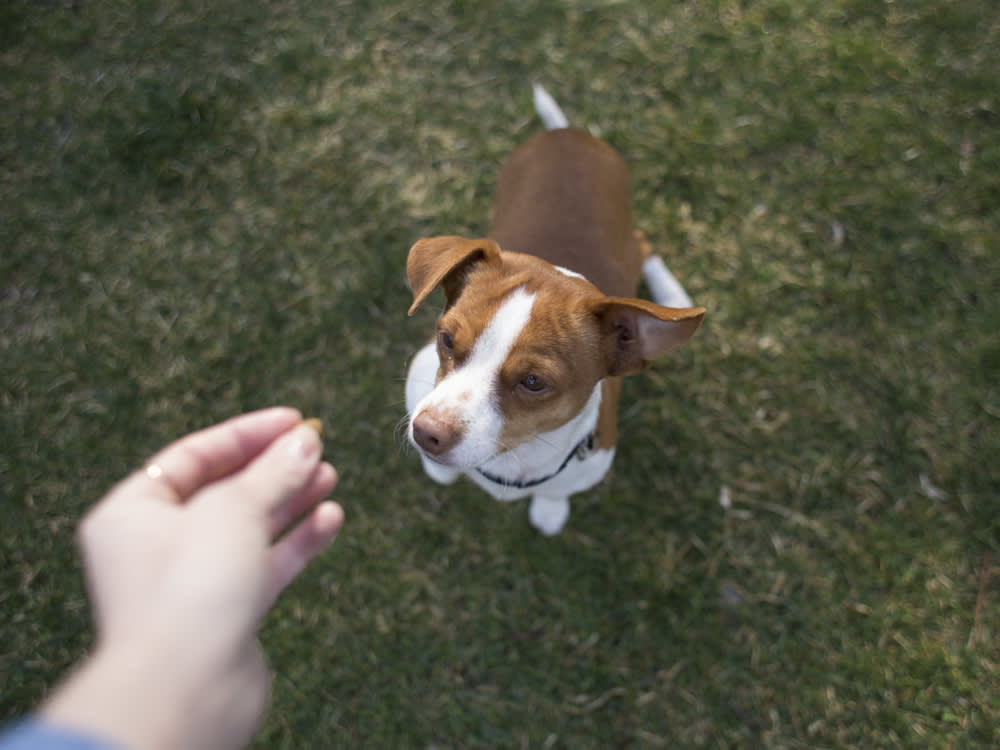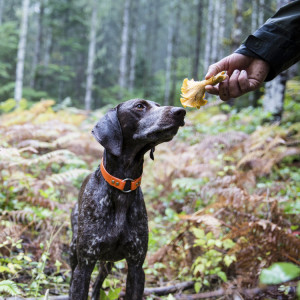Can Dogs Eat Almonds (and Other Nuts)?
This healthy snack for humans isn't so healthy for your pup. Here's why it's best to avoid them.

share article
Almonds are a healthy and satisfying snack for humans, but can you share them with your pup? Unfortunately, the consensus is probably not. While almonds aren’t necessarily toxic, they're difficult for dogs to digest, which is why they're on the list of foods it’s best for dogs to avoidopens in a new tab (walnuts and macadamia nuts are also on the list). Keep reading for more reasons why your dog shouldn't consume almonds — plus, what to do if they accidentally eat some.
Are Almonds Good For Dogs?
Almonds pose lots of health and safety risks for dogs, including:
1. Almonds are choking hazards.
Although in general, dogs are equipped to chew food in much the same way as humans, they don’t “nibble” almonds like we do. They’re more likely to swallow them whole. So there’s a chance that a nut can become lodged in their windpipe; smaller-sized dogs are especially at risk.
2. Almonds are too salty.
Snacking almonds are often heavily salted and seasoned, which causes us, and definitely, our dogs, to become very thirsty (think of those bowls of nuts so many bars generously provide for their customers). Too much salt can lead to water retention, which is especially dangerous for dogs with heart problems.
3. Almonds are high in fat.
Almonds are loaded with fat, which can contribute to a dog developing acute pancreatitisopens in a new tab; fat also aggravates chronic pancreatitis.
4. Almonds are high in phosphorus.
The mineral can lead to bladder or kidney stones. Some breeds of dogs, such as the Yorkshire Terrier and Lhasa Apso, are genetically predisposed to kidney stones, and Shih Tzu, Miniature Schnauzer, and Bichon Frise are prone to bladder stones.
What To Do If Your Dog Eats Almonds
The answer depends on the size of your dog and the amount and kind of almonds they consumed. If you think your dog only ate a few almonds and they don't appear to be experiencing esophageal obstruction, monitor them for diarrheaopens in a new tab or vomitingopens in a new tab for 12 hours.
If your dog ate a big bag of almonds, take them to the vet immediately (especially if they're a smaller dog). Your pup might require IV fluids for dehydration and drugs for pain management.
Can Dogs Have Almond Milk?
Almond milk is generally safe for your dog to drink, but it should only be served in moderation. Because almond milk is high in calories, some dogs might experience stomach issues, excess gas or diarrhea. Almond milk should only be given to dogs as a treat and in small quantities to prevent any potential digestive problems.
Can Dogs Eat Almond Butter?
Yes, dogs can eat almond butter but only in moderation and as long as there are no artificial sweeteners added. Carefully review ingredients to ensure that no toxic additives have been included. Xylitolopens in a new tab, an artificial sweetener, can be found in several brands of almond butter, and it can cause dogs serious problems, including hypoglycemia, liver disease, and blood-clotting disorders. So if you give your dog almond butter, make sure xylitol isn’t one of the ingredients. Another thing to watch out for is digestion issues. While most brands of almond butter aren’t toxic to dogs, this nut spread is still high in fat which can cause stomach issues in some dogs. It’s a good idea to consult your veterinarian before giving your pup new foods.
Are All Nuts and Nut Butters Bad for Dogs?
If you give your dog peanut butteropens in a new tab (and peanut butter treats), don't worry. These are fine for dogs because peanuts aren’t really a nut, but rather a legume. Still, it’s best not to give your dog individual peanuts, for many of the same reasons you should avoid giving them other types of nuts.

Claudia Kawczynska
Claudia Kawczynska was co-founder and editor-in-chief of The Bark for 20 years. She also edited the best-selling anthology Dog Is My Co-Pilot.
Related articles
![Various Veggie Chips in a Ceramic Blue Bowl]() opens in a new tab
opens in a new tabCan Dogs Eat Sweet Potatoes?
Add it to the list of healthy human superfoods pups can eat, too.
![Puppy eating a bowl of blueberries]() opens in a new tab
opens in a new tab10 Superfoods to Share With Your Dog
From kale to quinoa, these nutrient-packed picks deserve a spot in your dog’s food bowl.
![A dog sniffing a mushroom out of a hand.]() opens in a new tab
opens in a new tab6 Mushroom Superfoods that Won’t Turn Your Dog Into a Zombie
Nothing to fear here The Last of Us fans — ’shrooms are great immune-boosters.
![pet parents making homemade dog food cheaper for black dog climbing on counter]() opens in a new tab
opens in a new tabIs Cooking Your Dog’s Food Worth it?
A nutritionist on dogs’ unique dietary needs, important ingredients, and other pro tips for home-cooked dog food.



